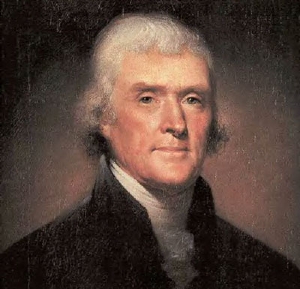Just right for Project Percy!
Thomas Jefferson supplied lists of recommended books in letters to Robert Skipwith1 in 1771 and Bernard Moore2 about the same time, to his nephew, Peter Carr, in 17853 and 1787,4 to John Minor5 in 1814, and to several others.6 The following is a distillation and synthesis of his recommendations in classical studies -- history, philosophy, religion, and literature. Items in each section are in a rough suggested reading order based by Jefferson's comments. Clearly more works could be added; as Jefferson wrote to Moore: "These by no means constitute the whole of what might be usefully read in each of these branches of science. The mass of excellent works going more into detail is great indeed. But those here noted will enable the student to select for himself such others of detail as may suit his particular views and dispositions. They will give him a respectable, an useful and satisfactory degree of knowlege in these branches."2 Ancient HistoryHerodotus - c. 450 BC, 'Father of History'
Xenophon - c. 400 BC, philosopher, student of Socrates, general
Josephus – c. 80 AD, Jewish general and historian Plutarch - c. 100 AD; Greek philosopher, Delphic priest, biographer, prolific writer
Herodian – c. 210 AD
Philosophy Plato – Athens, c. 400 BC
Xenophon – Greek, c. 400 BC
Epictetus – Greek Stoic philosopher writing in Roman times
Lucretius – c. 60 BC, Roman Epicurean philosopher John Locke – one of the most influential of Enlightenment thinkers
David Hume Voltaire Claude Adrien Helvétius
Henry St. John, Lord Bolingbroke James Beattie Two further suggestions consistent with Jefferson's lists are the Lives and Opinions of Eminent Philosophers by Diogenes Laertius and the Nicomachean Ethics of Aristotle. LiteratureHomer Virgil John Milton Sophocles
Horace – c. 10 BC, Roman lyric poet Metastasio (Pietro Antonio Domenico Trapassi, 1698 –1782) William Shakespeare Theocritus – 3rd century BC; Greek bucolic poet Anacreon - c. 540 BC, Greek lyrical poet Moliere Jonathan Swift – Anglo-Irish satirist Alexander Pope
American HistoryWilliam Robertson William Douglass [more] Thomas Hutchison William Smith Samuel Smith Benjamin Franklin Captain John Smith William Stith Sir William Keith Robert Beverly |
